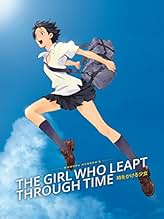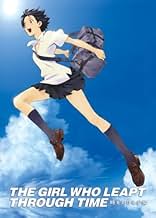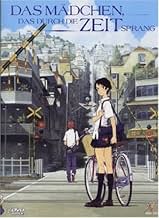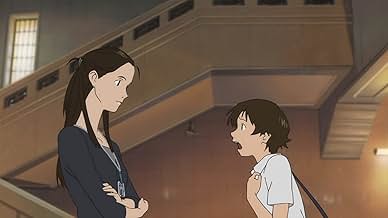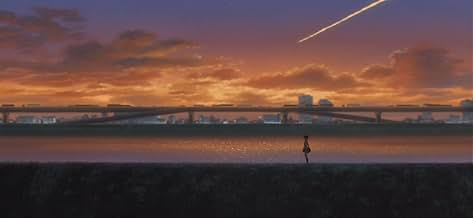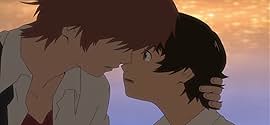AVALIAÇÃO DA IMDb
7,7/10
72 mil
SUA AVALIAÇÃO
Uma garota do ensino médio chamada Makoto adquire o poder de viajar no tempo e decide usá-lo para seus próprios benefícios pessoais.Uma garota do ensino médio chamada Makoto adquire o poder de viajar no tempo e decide usá-lo para seus próprios benefícios pessoais.Uma garota do ensino médio chamada Makoto adquire o poder de viajar no tempo e decide usá-lo para seus próprios benefícios pessoais.
- Prêmios
- 12 vitórias e 2 indicações no total
Riisa Naka
- Makoto Konno
- (narração)
Takuya Ishida
- Chiaki Mamiya
- (narração)
Mitsutaka Itakura
- Kosuke Tsuda
- (narração)
Ayami Kakiuchi
- Yuri Hayakawa
- (narração)
Mitsuki Tanimura
- Kaho Fujitani
- (narração)
Yuki Sekido
- Miyuki Konno
- (narração)
Utawaka Katsura
- Makoto's Father
- (narração)
Midori Ando
- Makoto's Mother
- (narração)
Fumihiko Tachiki
- Fukushima-sensei
- (narração)
Keiko Yamamoto
- Obasan
- (narração)
Shiori Yokohari
- Moriko Uesugi
- (narração)
Sonoka Matsuoka
- Sekimi Nowake
- (narração)
Takayuki Handa
- Kato
- (narração)
Maho Kurashima
- Female Newscaster A
- (narração)
Taeko Hase
- Additional Voices
- (narração)
Keiko Aizawa
- School Nurse
- (narração)
- …
Kiyomi Tanigawa
- Home Economics Teacher
- (narração)
- …
Atsuko Yuya
- Additional Voices
- (narração)
- Direção
- Roteiristas
- Elenco e equipe completos
- Produção, bilheteria e muito mais no IMDbPro
Enredo
Você sabia?
- CuriosidadesThis movie is an indirect adaptation of Yasutaka Tsutsui's novel "The Girl Who Leapt Through Time" - the main character's aunt is Yoshiyama Kazuko, the protagonist of the novel.
- Erros de gravaçãoSpoiler: During the time-stop sequence Chiaki laments that he will not be able to see the painting he has come to the past for because it is in restoration and he will not be around the next day when it is put on the wall. But Makoto knows that the picture is worked on by her aunt and so they could just go upstairs and take a look at it (they may find the door locked but the possibility is not even mentioned). Chiaki's last jump could not have erased that memory because Makoto's knowledge predates the event.
- Citações
Yuri Hayakawa: [Makoto Leaves the room, then Yuri watches the Blackboard] Makoto: Time waits for no one
- ConexõesFeatured in Glass Reflection: The Girl Who Leapt Through Time (2010)
Avaliação em destaque
There are about 10 Japanese films that I re-watch almost every year since their releases. "The Girl Who Leapt Through Time" is one of only three such animated films for me.
"The Girl Who Leapt Through Time" is based on a 1967 hit novel of the same title. The original work has been used in numerous film and dorama adaptations, most famous ones being the 1983 film directed by Oobayashi Nobuhiko. Instead of making just another anime adaptation and possibly becoming just another adaptation shadowed by the 1983 film, the producers took a risk by creating a spin-off movie with the setting of about 20 years after the original story. The gamble paid off big time, as the animated film went on to win at least 23 awards worldwide.
The underlying theme in this movie was "the importance of living the moment". Our protagonist was given the power to leap back into time to correct her mistakes, only to realize later that the short-term gains only lead to greater losses that followed. The story was extremely well-constructed to teach the lesson of embracing things the way they are, and never run from confrontations, because once that moment gone, you'll never get it back.
The director for this film did a phenomenal job of pacing and creating many memorable moments, but it was the live-action film screenwriter Okudera Satoko, who really made a difference for this movie by composing a story out of number of time leaps that slowly developed the main characters and made so many epic scenes possible. Many anime screenwriters fail in movies because they incorporate too many characters, as it is common practice in series, into the limited 100 minute time-frame. What's remarkable about this piece of work is that it focuses on only three main characters. Even counting the secondary cast, there are only 8 characters in total who we are given the names of. The limited number of characters not only improved character development, it also allowed the story to focus on the underlying theme.
I was actually very uncertain about the viewing this year because I started watching a lot of TV anime again since the last viewing. However, the only new flaws I've noticed was the excessive still motion in some scenes and most backgrounds, and that the protagonist was being a bit overly insensitive in few instances, which made her character a bit unrealistic. Animation is years ahead of its time, and it still is an excellent example of what happens when music is in harmony with the story/animation. The insert song by Oku Hanako, IMO, is still the best selection ever made among hundreds of Japanese films, anime, and live-action doramas I've encountered. Ending theme is a truly poignant one that really captured the mood and made the story sink in, and the music score throughout the movie has been used perfectly to enhance the drama.
"The Girl Who Leapt Through Time" is a timeless masterpiece that made me want to cherish every moment, and it's a movie I expect myself to be re-watching for many more years to come.
"The Girl Who Leapt Through Time" is based on a 1967 hit novel of the same title. The original work has been used in numerous film and dorama adaptations, most famous ones being the 1983 film directed by Oobayashi Nobuhiko. Instead of making just another anime adaptation and possibly becoming just another adaptation shadowed by the 1983 film, the producers took a risk by creating a spin-off movie with the setting of about 20 years after the original story. The gamble paid off big time, as the animated film went on to win at least 23 awards worldwide.
The underlying theme in this movie was "the importance of living the moment". Our protagonist was given the power to leap back into time to correct her mistakes, only to realize later that the short-term gains only lead to greater losses that followed. The story was extremely well-constructed to teach the lesson of embracing things the way they are, and never run from confrontations, because once that moment gone, you'll never get it back.
The director for this film did a phenomenal job of pacing and creating many memorable moments, but it was the live-action film screenwriter Okudera Satoko, who really made a difference for this movie by composing a story out of number of time leaps that slowly developed the main characters and made so many epic scenes possible. Many anime screenwriters fail in movies because they incorporate too many characters, as it is common practice in series, into the limited 100 minute time-frame. What's remarkable about this piece of work is that it focuses on only three main characters. Even counting the secondary cast, there are only 8 characters in total who we are given the names of. The limited number of characters not only improved character development, it also allowed the story to focus on the underlying theme.
I was actually very uncertain about the viewing this year because I started watching a lot of TV anime again since the last viewing. However, the only new flaws I've noticed was the excessive still motion in some scenes and most backgrounds, and that the protagonist was being a bit overly insensitive in few instances, which made her character a bit unrealistic. Animation is years ahead of its time, and it still is an excellent example of what happens when music is in harmony with the story/animation. The insert song by Oku Hanako, IMO, is still the best selection ever made among hundreds of Japanese films, anime, and live-action doramas I've encountered. Ending theme is a truly poignant one that really captured the mood and made the story sink in, and the music score throughout the movie has been used perfectly to enhance the drama.
"The Girl Who Leapt Through Time" is a timeless masterpiece that made me want to cherish every moment, and it's a movie I expect myself to be re-watching for many more years to come.
- ethSin
- 20 de jun. de 2010
- Link permanente
Principais escolhas
Faça login para avaliar e ver a lista de recomendações personalizadas
Detalhes
- Data de lançamento
- País de origem
- Centrais de atendimento oficiais
- Idioma
- Também conhecido como
- The Girl Who Leapt Through Time
- Empresas de produção
- Consulte mais créditos da empresa na IMDbPro
Bilheteria
- Faturamento bruto mundial
- US$ 1.421.529
- Tempo de duração1 hora 38 minutos
- Cor
- Mixagem de som
- Proporção
- 1.85 : 1
Contribua para esta página
Sugerir uma alteração ou adicionar conteúdo ausente

Principal brecha
What is the Hindi language plot outline for A Garota que Conquistou o Tempo (2006)?
Responda

